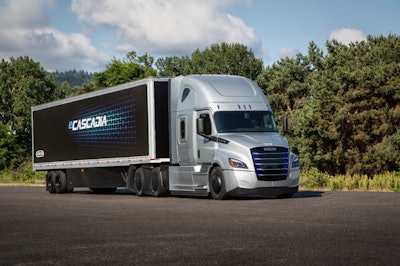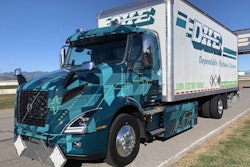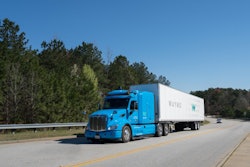 Damiler’s Freightliner brand began shipping the battery electric eCascadia truck last August.
Damiler’s Freightliner brand began shipping the battery electric eCascadia truck last August.Daimler Truck AG and the Volvo Group on Tuesday morning announced that the companies – two of the largest commercial truck manufacturers in the world – have signed an agreement to establish a new joint venture charged with the development, production and commercialization of fuel cell systems for heavy-duty vehicle applications and other use cases.
Under the terms of the agreement, Daimler will consolidate its current fuel cell activities in the joint venture and the Volvo Group will acquire 50% in the joint venture for the sum of approximately $650 million. The companies will be 50/50 partners in the joint venture, which will operate as an independent and autonomous entity, and Daimler Truck AG and the Volvo Group will continue to be competitors in all other areas of business.
Martin Daum, Daimler Truck AG chairman of the Board of Management and member of the board of management of Daimler AG, who called the partnership “a milestone in bringing fuel cell powered trucks and buses onto our roads,” said fuel cells were an important step in carbon-neutral transportation, “and a technology where Daimler has built up significant expertise through its Mercedes-Benz fuel cell unit over the last two decades.”
Both companies plan to, and the goal for this partnership is, offer heavy-duty vehicles with fuel cells for long-haul applications in the second half of the decade. In addition, other automotive and non-automotive use cases are also part of the new joint venture’s scope.
“Electrification of road transport is a key element in delivering the so called Green Deal, a carbon neutral Europe and ultimately a carbon neutral world,” said Martin Lundstedt, Volvo Group President and CEO. “Using hydrogen as a carrier of green electricity to power electric trucks in long-haul operations is one important part of the puzzle, and a complement to battery electric vehicles and renewable fuels.”
The joint venture will include the operations in Nabern, Germany, headquarters of the Mercedes-Benz Fuel Cell, with production facilities in Germany and Canada.
“Combining the Volvo Group and Daimler’s experience in this area to accelerate the rate of development is good both for our customers and for society as a whole,” Lundstedt added. “By forming this joint venture, we are clearly showing that we believe in hydrogen fuel cells for commercial vehicles. But for this vision to become reality, other companies and institutions also need to support and contribute to this development, not least in order to establish the fuel infrastructure needed.”









